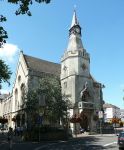Banbury is a historic market town on the River Cherwell in Oxfordshire, England. It had a population of 46,853 at the 2011 census.
Banbury is a significant commercial and retail centre for the surrounding area of north Oxfordshire and southern parts of Warwickshire and Northamptonshire which are predominantly rural. Banbury's main industries are motorsport, car components, electrical goods, plastics, food processing, and printing. Banbury is home to the world's largest coffee-processing facility (Jacobs Douwe Egberts), built in 1964. The town is famed for Banbury cakes – similar to Eccles cakes but oval in shape.
Banbury is 64 miles (103 km) northwest of London, 37 miles (60 km) southeast of Birmingham, 27 miles (43 km) southeast of Coventry and 22 miles (35 km) northwest of Oxford.
History
Toponymy
The name Banbury derives from "Banna", a Saxon chieftain said to have built a stockade there in the 6th century (or possibly a byname from Old English: bana meaning felon, murderer), and burgh / burh meaning settlement. In Anglo Saxon it was called Banesburh (dative Banesbyrig). The name appears as Banesberie in the Domesday Book. Another known spelling was Banesebury in Medieval times.
General history
During excavations for the construction of an office building in Hennef Way in 2002, the remains of a British Iron Age settlement with circular buildings dating back to 200 BC were found. The site contained around 150 pieces of pottery and stone. Later there was a Roman villa at nearby Wykham Park.
The area was settled by the Saxons around the late 5th century. In about 556 Banbury was the scene of a battle between the local Anglo-Saxons of Cynric and Ceawlin, and the local Romano-British. It was a local centre for Anglo-Saxon settlement by the mid-6th century. Banbury developed in the Anglo-Saxon period under Danish influence, starting in the late 6th century. I
